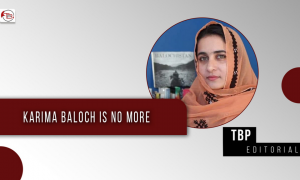Karima Baloch’s name has been synonymous with the current phase of Baloch nationalist politics. Not only Baloch activists but others in the region have always felt her giant presence in the Baloch “struggle for freedom” as a prominent figure.
Karima begun her political career at a very young age through the platform of Baloch Students Organisation. She climbed the ranks of the organisation rapidly due to her capabilities, commitment and charismatic personality. In 2006 she became a central committee member of Baloch Students Organisation – Azad. In 2008 she was selected as the Junior Vice Chairperson. She continued to be a leading figure in organisation’s decision making and became the Senior Vice Chairperson of BSO-A in 2012.
When BSO-A’s Chairman Zahid Baloch was abducted allegedly by the Pakistani intelligence agencies on 14 March 2014, Karima Baloch was at forefront of the campaign for his release. Later in the 20th Council Session of BSO-Azad in 2015, Karima Baloch was elected as the organisation’s Chairperson, making history.
Karima Baloch was not only the first woman to lead the Baloch Students Organization in organisation’s history of seven decades but is also believed to be the pioneer of women activism in Balochistan. She broke the taboos and took to street activism in an otherwise traditionalist society. She maintained that “A national liberation movement without the participation of women is incomplete”. Her acts encouraged many other women to follow the path, and today almost all Baloch political parties have Baloch women in their leadership ranks.
In 2016, the leading British broadcasting corporation, BBC chose Karima as one of the world’s 100 most “inspirational and influential” women.
Due to her unflinching activism, she was always a target of malice campaigns and faced grave threats allegedly from authorities. She moved to Canada to find refuge and remained there until her dead body was found on 21st December 2020.
She went missing a day earlier on 20th December and police sought public assistance to locate her. However, late on Monday Karima’s family confirmed her demise but did not disclose any details. Meanwhile, Toronto Police is also investigating the death and has released no more information about the case.
Her sudden death in mysterious circumstances has raised serious concerns for Baloch refugees living outside Balochistan. There have now been multiple cases of Baloch refugees being targeted in Afghanistan, Iran, Europe and now in Canada too. On the day of Karima’s disappearance Two Baloch refugees from the Bugti tribe of Balochistan were killed in a firing incident in Kandahar, Afghanistan.
Earlier in March 2020, another Baloch refugee and journalist Sajid Hussain went missing from Sweden. His body was later found from a river. His family, friends and acquaintances claim that he was murdered. Reporters without Borders (RSF), a Paris-based journalists’ organisation, alleged that Mr Hussain’s mysterious disappearance and subsequent death could have been organized by the Pakistani intelligence agencies – ISI and MI – due to his work as a journalist.
The Baloch political organisations claim that major refugee rights organizations of the world, including the United Nations High Commissioner for Refugees, have failed to protect and help the Baloch immigrants. These organisations have demanded the international human rights groups to take notice of grave security threats being faced by the Baloch refugees across the world.
The international community particularly the western countries have a responsibility to assure that activists who are living in their countries are protected. A grant of refugee status should be more than just a right to remain, and security must be provided to the dissidents who have been forced to leave their homelands due to state prosecution. If any involvement of a foreign state is proved in these mysterious deaths, then diplomatic relations with such states should be severed and international sanctions should be sought.










Comments